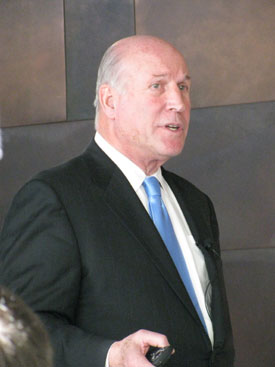North Central Hosts Understanding the Animal Activist Movement
 With a changing environment for animal agriculture, the October 20th North Central NAMA event featured Rick Berman, founder of HumaneWatch.org and Center for Consumer Freedom, sharing his unique insight. Nearly 60 NAMA members and Minnesota agribusiness leaders attended this event at the University of Minnesota Alumni Center.
With a changing environment for animal agriculture, the October 20th North Central NAMA event featured Rick Berman, founder of HumaneWatch.org and Center for Consumer Freedom, sharing his unique insight. Nearly 60 NAMA members and Minnesota agribusiness leaders attended this event at the University of Minnesota Alumni Center.
Berman shared some of his strategies in combating the messages from Humane Society of the United States (HSUS) and People for the Ethical Treatment of Animals (PETA). Berman says he works to marginalize the message and reputation which will help redirect money from the group. He said it is important to give people an alternative. “When we expose that HSUS spends less than a half of a percent of the money raised on supporting local animal shelters, we have to give them an alternative,” said Berman. “We ask them to give the money directly to their local shelter, not HSUS, if they really want to support animals.”
This experienced lobbyist also said that it is important to create common knowledge. He explained that common knowledge is created by sharing the information in so many different ways and with such frequency that people begin quoting the information without always citing a source.
Berman said that when dealing with animal activist groups don’t be afraid to use criticism to get a message across. “Criticism stays with people longer than a happy emotional message,” said Berman. “We use facts to counteract their message and criticize their position.”
Berman admitted it is easier for a group like HumaneWatch.org to use criticism as a tactic than for an agribusiness company or producer organization. He did say that all of agriculture needs to be consistent in calling out inaccuracies in media reports, news articles and letters to the editor. “You can’t just hit it occasionally—you have to be consistent,” emphasized Berman.
One success story Berman shared with the audience is that HSUS raised the same money in 2010 as in 2009. However, they had to spend $9 million plus in media in 2010 compared to $1.2 million in 2009 to raise the same money. “Public opinion doesn’t change overnight but we are making progress.”
Berman wrapped up his presentation by saying that the greatest challenge in battle HSUS is that the protein industry doesn’t have an overall leader. “We move the ball down the field but we don’t score the big win because we don’t have the firepower directed at the same target,” said Berman. “We need to focus on one goal to have success.”
No comments.
No comments are allowed on this page.